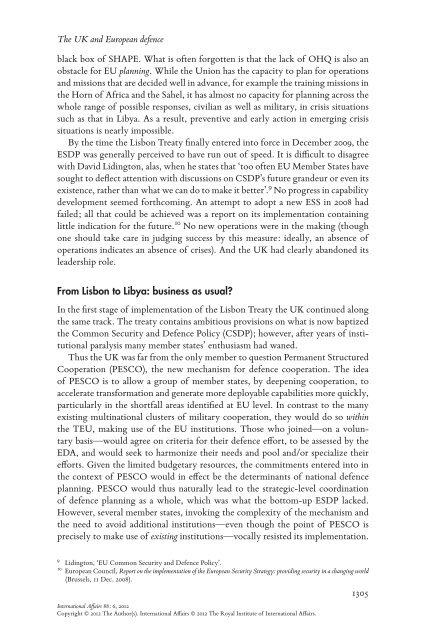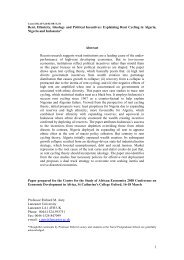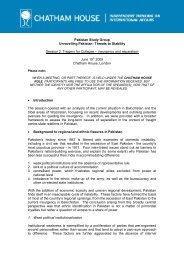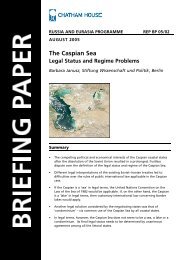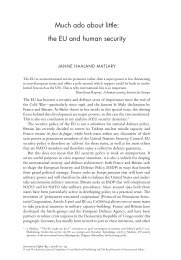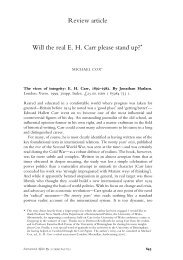The UK and European defence: leading or leaving? - Chatham House
The UK and European defence: leading or leaving? - Chatham House
The UK and European defence: leading or leaving? - Chatham House
You also want an ePaper? Increase the reach of your titles
YUMPU automatically turns print PDFs into web optimized ePapers that Google loves.
<strong>The</strong> <strong>UK</strong> <strong>and</strong> <strong>European</strong> <strong>defence</strong><br />
black box of SHAPE. What is often f<strong>or</strong>gotten is that the lack of OHQ is also an<br />
obstacle f<strong>or</strong> EU planning. While the Union has the capacity to plan f<strong>or</strong> operations<br />
<strong>and</strong> missions that are decided well in advance, f<strong>or</strong> example the training missions in<br />
the H<strong>or</strong>n of Africa <strong>and</strong> the Sahel, it has almost no capacity f<strong>or</strong> planning across the<br />
whole range of possible responses, civilian as well as military, in crisis situations<br />
such as that in Libya. As a result, preventive <strong>and</strong> early action in emerging crisis<br />
situations is nearly impossible.<br />
By the time the Lisbon Treaty finally entered into f<strong>or</strong>ce in December 2009, the<br />
ESDP was generally perceived to have run out of speed. It is difficult to disagree<br />
with David Lidington, alas, when he states that ‘too often EU Member States have<br />
sought to deflect attention with discussions on CSDP’s future gr<strong>and</strong>eur <strong>or</strong> even its<br />
existence, rather than what we can do to make it better’. 9 No progress in capability<br />
development seemed f<strong>or</strong>thcoming. An attempt to adopt a new ESS in 2008 had<br />
failed; all that could be achieved was a rep<strong>or</strong>t on its implementation containing<br />
little indication f<strong>or</strong> the future. 10 No new operations were in the making (though<br />
one should take care in judging success by this measure: ideally, an absence of<br />
operations indicates an absence of crises). And the <strong>UK</strong> had clearly ab<strong>and</strong>oned its<br />
leadership role.<br />
From Lisbon to Libya: business as usual?<br />
In the first stage of implementation of the Lisbon Treaty the <strong>UK</strong> continued along<br />
the same track. <strong>The</strong> treaty contains ambitious provisions on what is now baptized<br />
the Common Security <strong>and</strong> Defence Policy (CSDP); however, after years of institutional<br />
paralysis many member states’ enthusiasm had waned.<br />
Thus the <strong>UK</strong> was far from the only member to question Permanent Structured<br />
Cooperation (PESCO), the new mechanism f<strong>or</strong> <strong>defence</strong> cooperation. <strong>The</strong> idea<br />
of PESCO is to allow a group of member states, by deepening cooperation, to<br />
accelerate transf<strong>or</strong>mation <strong>and</strong> generate m<strong>or</strong>e deployable capabilities m<strong>or</strong>e quickly,<br />
particularly in the sh<strong>or</strong>tfall areas identified at EU level. In contrast to the many<br />
existing multinational clusters of military cooperation, they would do so within<br />
the TEU, making use of the EU institutions. Those who joined—on a voluntary<br />
basis—would agree on criteria f<strong>or</strong> their <strong>defence</strong> eff<strong>or</strong>t, to be assessed by the<br />
EDA, <strong>and</strong> would seek to harmonize their needs <strong>and</strong> pool <strong>and</strong>/<strong>or</strong> specialize their<br />
eff<strong>or</strong>ts. Given the limited budgetary resources, the commitments entered into in<br />
the context of PESCO would in effect be the determinants of national <strong>defence</strong><br />
planning. PESCO would thus naturally lead to the strategic-level co<strong>or</strong>dination<br />
of <strong>defence</strong> planning as a whole, which was what the bottom-up ESDP lacked.<br />
However, several member states, invoking the complexity of the mechanism <strong>and</strong><br />
the need to avoid additional institutions—even though the point of PESCO is<br />
precisely to make use of existing institutions—vocally resisted its implementation.<br />
9<br />
Lidington, ‘EU Common Security <strong>and</strong> Defence Policy’.<br />
10<br />
<strong>European</strong> Council, Rep<strong>or</strong>t on the implementation of the <strong>European</strong> Security Strategy: providing security in a changing w<strong>or</strong>ld<br />
(Brussels, 11 Dec. 2008).<br />
International Affairs 88: 6, 2012<br />
Copyright © 2012 <strong>The</strong> Auth<strong>or</strong>(s). International Affairs © 2012 <strong>The</strong> Royal Institute of International Affairs.<br />
1305


